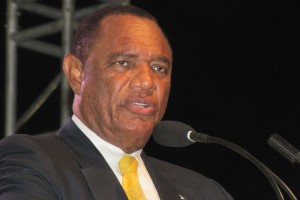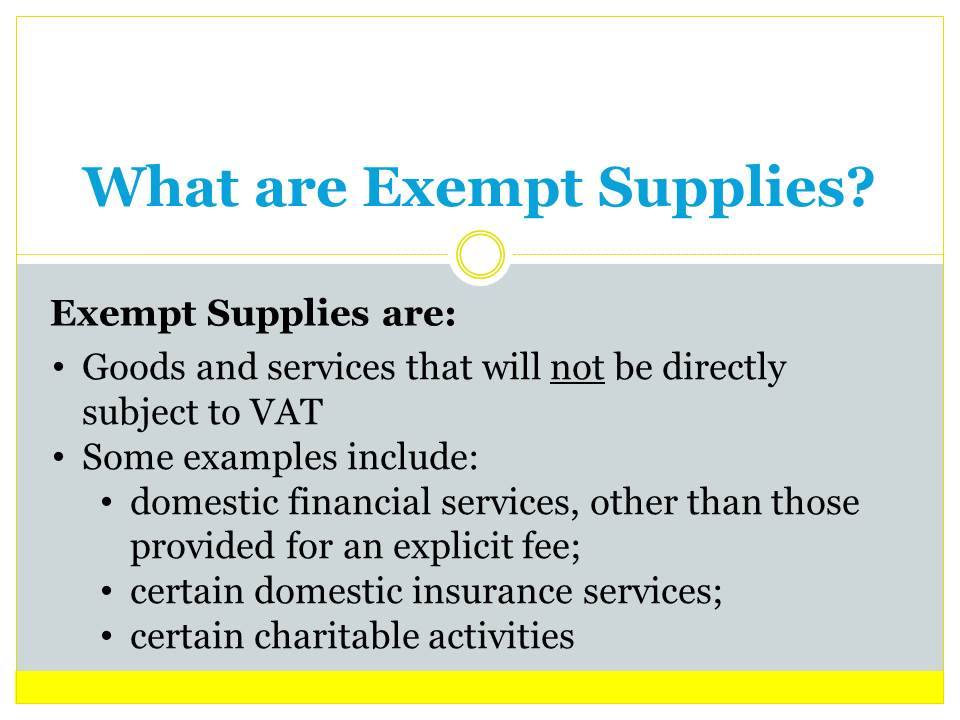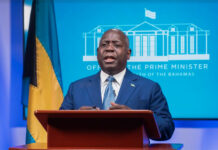
Nassau, Bahamas – Communication By The Rt. Hon. Perry G. Christie, M.P. Prime Minister and Minister of Finance During the Constitutional Amendments Debate On August 18, 2014 In the House of Assembly:
TALKING POINTS: DEBATE OF CONSTITUTIONAL BILLS
RESTORATION OF BIPARTISAN UNITY
Gratifying to me that substantial unanimity appears to have been restored, as between the Government and the Opposition, on the four bills.
I commend the Leader of the Opposition and his colleagues for seeing their way clear to take this supporting position once again.
In this regard, I cannot tire of repeating that robust and sustained bi-partisan support is absolutely essential to the success of this constitutional reform exercise. We started down this path together. We seem to have been separated for a brief time last week but I’m happy that we now seem to be moving in tandem in the same direction towards the same common purpose once again.
Clearly, however, there are still some differences between the Government and Opposition but these differences appear to be technical rather than philosophical; differences that relate more to how the bills are worded in some respects, rather than differences as to the core-principles and core-objectives of the bills.
I’m confident that these technical differences can be worked out between now and the time that the bills come out of committee which will be the next stage of the legislative process.
And there’s nothing wrong with that. There’s still time. Nothing has been passed yet. Nothing has been etched in stone yet. So I welcome the further input that the Opposition has indicated that they would like to make to the tweaking of the bills.
I also welcome the further input of the Opposition on matters related to the timing of, and preparations for, the referendum, and how the Opposition thinks it might want to assist in spreading the message of support for the bills. I know that the Constitutional Commission has already engaged in consultations with the two main parties on this; that it will continue to do so; and indeed that the Commission intends to extend these consultations to the DNA and to other important groupings across a broad spectrum of civil society, and to the religious community as well. In fact, three important meetings with religious leaders have been held already and the next one is scheduled for the 4th September.
No Coercion on anyone to toe the Party line
Need to speak to this, particularly in light of some unfortunate comments made by the Member for Fort Charlotte which conveyed the impression that members of the Government were somehow under some compulsion to think or speak a certain way on the bills.
Nothing could be further from the truth. I need to be very clear on that. No Member of this House has, to my knowledge, been threatened or bullied or coerced into supporting these bills.
What the Bills are about, inclusive of the new amendments
Common Objective of the Bills:
To outlaw discrimination based on sex, that is to say, discrimination based on whether one is male or female; and to give particular expression to this principle of non-discrimination in relation to citizenship so that what has always applied exclusively to one sex will in the future apply equally to both sexes, that is to say, to both men and women.
Bill # 4 is the bill that will enshrine the principle of equality between men and women; and bills 1, 2 and 3 will apply that principle to matters of citizenship.
And in this regard, let me adopt, with complete approval, the very wise observation made by the Member for Marathon this morning that these bills are not limited to protecting the rights of women. These bills – especially bills 3 and 4 – are equally important for men as well.
In fact, bill # 3 is all about giving Bahamian men the same right to pass citizenship to their children born out of wedlock, a right that up to now only women have enjoyed. So men are the only real beneficiaries of the change that will be brought about under Bill # 3. Women have always had the right in question here.
Similarly, Bill # 4 is not just for women. It will apply in equal measure to men, protecting both men and women, from discriminatory treatment. So, under Bill # 4, a man would have exactly the same right that a woman would have to go to court to get relief if he can show that he is being discriminated against based on his being a male.
So let’s be conscious of that. These bills will be for the benefit of both men and women. Philosophically, the driving force behind all the bills, all four of them, is the principle that we must cease, as a nation, to base our laws and policies and administrative actions, on whether someone is a male or female.
That is the long and short of the four bills when viewed as a compendium.
Recapping the essence of each bill; updating the snapshots that I gave in my initial communication three weeks ago
Bill # 1 : The Bahamas Constitution (Amendment) Bill, 2014
This bill seeks it seeks to give a child born outside The Bahamas to a Bahamian-born mother and non-Bahamian father the same right to Bahamian citizenship at birth that the Constitution already gives to a child born outside The Bahamas to a Bahamian-born father and a non-Bahamian mother. This bill is therefore simply doing for Bahamian married mothers what it has done for Bahamian married fathers for the past 41 years. That’s the long and the short of it.
I need to emphasize once again, as I have before, that the right to pass Bahamian citizenship to one’s child under this Bill # 1 will only apply where the Bahamian parent is himself, or herself, a native-born Bahamian. This has always been the case in relation to Bahamian fathers of children born abroad and this will not change when this right is extended to Bahamian mothers of children born abroad. In either case, only a native-born Bahamian will be able to pass citizenship to their children born abroad.
I also want to re-affirm that although this bill # 1, like all of the bills, will only apply going forward – not retroactively – my government, as a matter of administrative policy, will grant Bahamian citizenship to all applicants born abroad after July 9th, 1973 (and before the law changes) to a Bahamian-born mother and non-Bahamian father, subject, of course, to the exceptions, and in accordance with the procedures, prescribed under the Bahamas Nationality Act
Bill #2 : The Bahamas Constitution (Amendment) (No.2) Bill, 2014
Bill # 2 also seeks to achieve equality between men and women in another respect under the Constitution: it seeks to enable a foreign spouse of a Bahamian citizen to apply for and obtain – I repeat to apply for and obtain – citizenship provided that he or she meets the prescribed criteria laid down in the Bahamas Nationality Act in relation to national security and public policy…and….subject to ensuring that the foreign spouse is not a convicted criminal, and subject further to ensuring that it is not a sham or bogus marriage that is in play.
Only if the foreign spouse can meet that criteria can he or she qualify for citizenship. It is not automatic and anyone who tells you otherwise is simply wrong!
Bill #3 : The Bahamas Constitution (Amendment) (No.3) Bill, 2014
Bill # 3, as I said just a few moments ago, is of special importance because it seeks to lift the burden of discrimination off the backs of Bahamian men in one area of citizenship in which they are discriminated against.
An unwed Bahamian father cannot at present pass his citizenship to a child born to a foreign woman. This bill seeks to change that. It will give an unwed Bahamian father the same right to pass citizenship to his child that a Bahamian woman has always had under the Constitution in relation to children born out of wedlock.
This bill, however, will require proof of paternity before citizenship can be passed by a Bahamian father to a child born out of wedlock.
In this regard, the Status of Children Act is being amended to not only apply it to matters of citizenship but also to ensure that the usual methods of proving paternity will not be avilable to secure a right as sacred as citizenship. Instead, DNA testing will be required as proof of paternity.
Bill #4 : The Bahamas Constitution (Amendment) (No.4) Bill, 2014
Finally, Bill #4 seeks to end discrimination based on sex. This will involve the insertion of the word “sex” in Article 26 of the Constitution so as to make it unconstitutional to discriminate based on a whether someone is male or female. In addition, there will be a new amendment designed to allay fears that this might somehow open the door to same-sex marriages. In this regard, it is now proposed to insert a definition of “sex” as meaning male or female.
I do not need to enter into the debate on the law pertaining to this issue because it has already been dealt with most ably by the Member for South Eleuthera, the Member for Marathon and by the Member for Cat Island.
I merely repeat what I said before. Bill #4 will not make same-sex marriages lawful. Such unions are already treated as void under the Matrimonial Causes Act and they will continue to be void if Bill #4 is enacted into law.
SIMPLIFICATION OF QUESTIONS:
I am happy that the Constitutional Commission has recommended a simplification of the referendum questions. It is therefore proposed that the questions will be simplified to read as follows:
BILL #1
Do you approve of The Bahamas Constitution (Amendment) Bill 2014?
Under this proposed change to the Constitution, a child born outside The Bahamas would become a Bahamian citizen at birth if either its mother or father is a citizen of The Bahamas by birth.
BILL #2
Do you approve of The Bahamas Constitution (Amendment) (No. 2) Bill 2014?
Under this proposed change to the Constitution, the foreign spouse of a Bahamian citizen would be able to obtain citizenship subject to satisfying:-
(i) existing national security and public policy considerations; and
(ii) new provisions guarding against marriages of convenience.
BILL #3
Do you approve of The Bahamas Constitution (Amendment) (No. 3) Bill 2014?
Under this proposed change to the Constitution, a Bahamian father of a child born out of wedlock would be able to pass his citizenship to that child subject to legal proof that he is the father.
BILL #4
Do you approve of The Bahamas Constitution (Amendment) (No. 4) Bill 2014?
Under this proposed change to the Constitution, it would be unlawful to discriminate based on sex, and “sex” would be defined as meaning male or female.
___
Communication By
The Rt. Hon. Perry G. Christie, M.P.
Prime Minister and Minister of Finance
During the
Constitutional Amendments Debate
On August 18, 2014
In the House of Assembly
TALKING POINTS:
DEBATE OF CONSTITUTIONAL BILLS
RESTORATION OF BIPARTISAN UNITY
Gratifying to me that substantial unanimity appears to have been restored, as between the Government and the Opposition, on the four bills.
I commend the Leader of the Opposition and his colleagues for seeing their way clear to take this supporting position once again.
In this regard, I cannot tire of repeating that robust and sustained bi-partisan support is absolutely essential to the success of this constitutional reform exercise. We started down this path together. We seem to have been separated for a brief time last week but I’m happy that we now seem to be moving in tandem in the same direction towards the same common purpose once again.
Clearly, however, there are still some differences between the Government and Opposition but these differences appear to be technical rather than philosophical; differences that relate more to how the bills are worded in some respects, rather than differences as to the core-principles and core-objectives of the bills.
I’m confident that these technical differences can be worked out between now and the time that the bills come out of committee which will be the next stage of the legislative process.
And there’s nothing wrong with that. There’s still time. Nothing has been passed yet. Nothing has been etched in stone yet. So I welcome the further input that the Opposition has indicated that they would like to make to the tweaking of the bills.
I also welcome the further input of the Opposition on matters related to the timing of, and preparations for, the referendum, and how the Opposition thinks it might want to assist in spreading the message of support for the bills. I know that the Constitutional Commission has already engaged in consultations with the two main parties on this; that it will continue to do so; and indeed that the Commission intends to extend these consultations to the DNA and to other important groupings across a broad spectrum of civil society, and to the religious community as well. In fact, three important meetings with religious leaders have been held already and the next one is scheduled for the 4th September.
No Coercion on anyone to toe the Party line
Need to speak to this, particularly in light of some unfortunate comments made by the Member for Fort Charlotte which conveyed the impression that members of the Government were somehow under some compulsion to think or speak a certain way on the bills.
Nothing could be further from the truth. I need to be very clear on that. No Member of this House has, to my knowledge, been threatened or bullied or coerced into supporting these bills.
What the Bills are about, inclusive of the new amendments
Common Objective of the Bills:
To outlaw discrimination based on sex, that is to say, discrimination based on whether one is male or female; and to give particular expression to this principle of non-discrimination in relation to citizenship so that what has always applied exclusively to one sex will in the future apply equally to both sexes, that is to say, to both men and women.
Bill # 4 is the bill that will enshrine the principle of equality between men and women; and bills 1, 2 and 3 will apply that principle to matters of citizenship.
And in this regard, let me adopt, with complete approval, the very wise observation made by the Member for Marathon this morning that these bills are not limited to protecting the rights of women. These bills – especially bills 3 and 4 – are equally important for men as well.
In fact, bill # 3 is all about giving Bahamian men the same right to pass citizenship to their children born out of wedlock, a right that up to now only women have enjoyed. So men are the only real beneficiaries of the change that will be brought about under Bill # 3. Women have always had the right in question here.
Similarly, Bill # 4 is not just for women. It will apply in equal measure to men, protecting both men and women, from discriminatory treatment. So, under Bill # 4, a man would have exactly the same right that a woman would have to go to court to get relief if he can show that he is being discriminated against based on his being a male.
So let’s be conscious of that. These bills will be for the benefit of both men and women. Philosophically, the driving force behind all the bills, all four of them, is the principle that we must cease, as a nation, to base our laws and policies and administrative actions, on whether someone is a male or female.
That is the long and short of the four bills when viewed as a compendium.
Recapping the essence of each bill; updating the snapshots that I gave in my initial communication three weeks ago
Bill # 1 : The Bahamas Constitution (Amendment) Bill, 2014
This bill seeks it seeks to give a child born outside The Bahamas to a Bahamian-born mother and non-Bahamian father the same right to Bahamian citizenship at birth that the Constitution already gives to a child born outside The Bahamas to a Bahamian-born father and a non-Bahamian mother. This bill is therefore simply doing for Bahamian married mothers what it has done for Bahamian married fathers for the past 41 years. That’s the long and the short of it.
I need to emphasize once again, as I have before, that the right to pass Bahamian citizenship to one’s child under this Bill # 1 will only apply where the Bahamian parent is himself, or herself, a native-born Bahamian. This has always been the case in relation to Bahamian fathers of children born abroad and this will not change when this right is extended to Bahamian mothers of children born abroad. In either case, only a native-born Bahamian will be able to pass citizenship to their children born abroad.
I also want to re-affirm that although this bill # 1, like all of the bills, will only apply going forward – not retroactively – my government, as a matter of administrative policy, will grant Bahamian citizenship to all applicants born abroad after July 9th, 1973 (and before the law changes) to a Bahamian-born mother and non-Bahamian father, subject, of course, to the exceptions, and in accordance with the procedures, prescribed under the Bahamas Nationality Act
Bill #2 : The Bahamas Constitution (Amendment) (No.2) Bill, 2014
Bill # 2 also seeks to achieve equality between men and women in another respect under the Constitution: it seeks to enable a foreign spouse of a Bahamian citizen to apply for and obtain – I repeat to apply for and obtain – citizenship provided that he or she meets the prescribed criteria laid down in the Bahamas Nationality Act in relation to national security and public policy…and….subject to ensuring that the foreign spouse is not a convicted criminal, and subject further to ensuring that it is not a sham or bogus marriage that is in play.
Only if the foreign spouse can meet that criteria can he or she qualify for citizenship. It is not automatic and anyone who tells you otherwise is simply wrong!
Bill #3 : The Bahamas Constitution (Amendment) (No.3) Bill, 2014
Bill # 3, as I said just a few moments ago, is of special importance because it seeks to lift the burden of discrimination off the backs of Bahamian men in one area of citizenship in which they are discriminated against.
An unwed Bahamian father cannot at present pass his citizenship to a child born to a foreign woman. This bill seeks to change that. It will give an unwed Bahamian father the same right to pass citizenship to his child that a Bahamian woman has always had under the Constitution in relation to children born out of wedlock.
This bill, however, will require proof of paternity before citizenship can be passed by a Bahamian father to a child born out of wedlock.
In this regard, the Status of Children Act is being amended to not only apply it to matters of citizenship but also to ensure that the usual methods of proving paternity will not be avilable to secure a right as sacred as citizenship. Instead, DNA testing will be required as proof of paternity.
Bill #4 : The Bahamas Constitution (Amendment) (No.4) Bill, 2014
Finally, Bill #4 seeks to end discrimination based on sex. This will involve the insertion of the word “sex” in Article 26 of the Constitution so as to make it unconstitutional to discriminate based on a whether someone is male or female. In addition, there will be a new amendment designed to allay fears that this might somehow open the door to same-sex marriages. In this regard, it is now proposed to insert a definition of “sex” as meaning male or female.
I do not need to enter into the debate on the law pertaining to this issue because it has already been dealt with most ably by the Member for South Eleuthera, the Member for Marathon and by the Member for Cat Island.
I merely repeat what I said before. Bill #4 will not make same-sex marriages lawful. Such unions are already treated as void under the Matrimonial Causes Act and they will continue to be void if Bill #4 is enacted into law.
SIMPLIFICATION OF QUESTIONS:
I am happy that the Constitutional Commission has recommended a simplification of the referendum questions. It is therefore proposed that the questions will be simplified to read as follows:
BILL #1
Do you approve of The Bahamas Constitution (Amendment) Bill 2014?
Under this proposed change to the Constitution, a child born outside The Bahamas would become a Bahamian citizen at birth if either its mother or father is a citizen of The Bahamas by birth.
BILL #2
Do you approve of The Bahamas Constitution (Amendment) (No. 2) Bill 2014?
Under this proposed change to the Constitution, the foreign spouse of a Bahamian citizen would be able to obtain citizenship subject to satisfying:-
(i) existing national security and public policy considerations; and
(ii) new provisions guarding against marriages of convenience.
BILL #3
Do you approve of The Bahamas Constitution (Amendment) (No. 3) Bill 2014?
Under this proposed change to the Constitution, a Bahamian father of a child born out of wedlock would be able to pass his citizenship to that child subject to legal proof that he is the father.
BILL #4
Do you approve of The Bahamas Constitution (Amendment) (No. 4) Bill 2014?
Under this proposed change to the Constitution, it would be unlawful to discriminate based on sex, and “sex” would be defined as meaning male or female.









